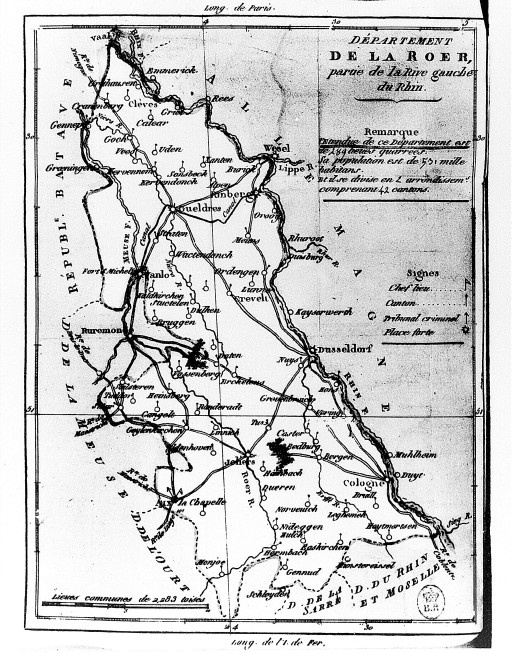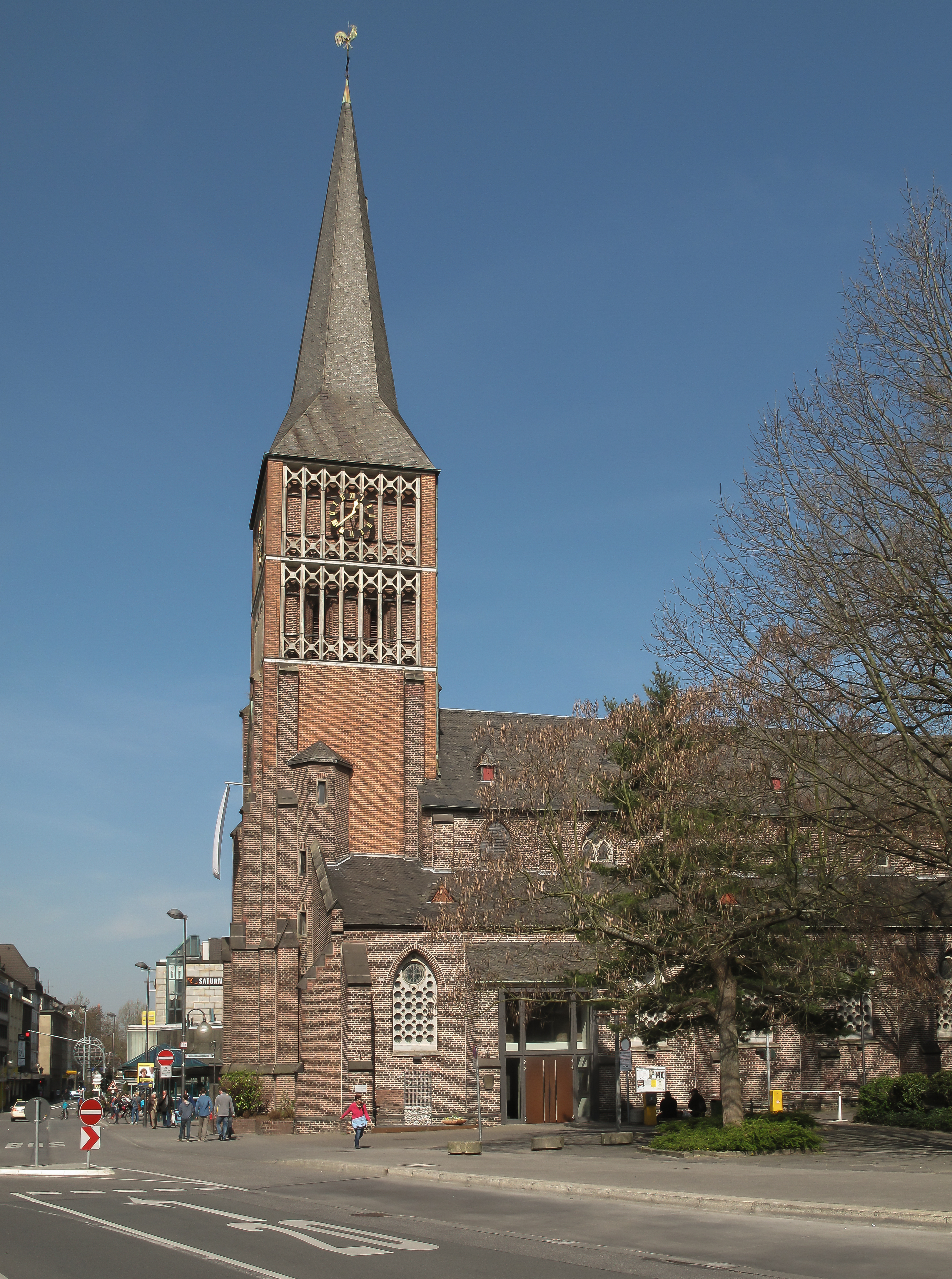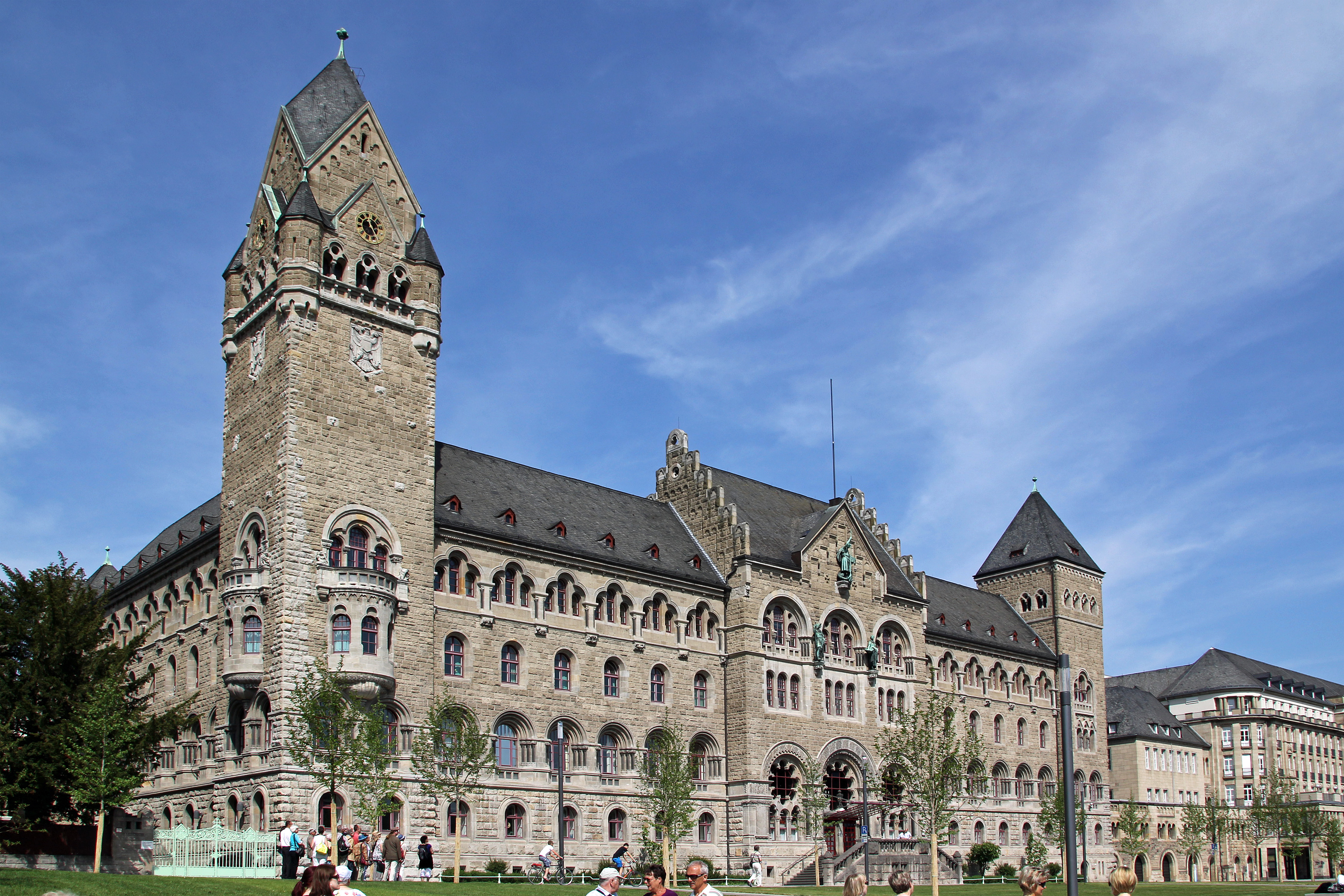|
Odenkirchen
Odenkirchen is a former town in Germany, presently part of the city Mönchengladbach. It is situated on the river Niers, 21 miles by rail south-west of Düsseldorf. It has a railway station ( Rheydt-Odenkirchen), on the line from Mönchengladbach to Grevenbroich and Cologne. Pop. (2000) 19,993. Odenkirchen castle was the seat of the lords of Odenkirchen from the 12th century. From 1794 to 1814, Odenkirchen was part of the French Roer département, from 1815 to 1918 part of the Kingdom of Prussia ( Province of Jülich-Cleves-Berg, Rhine Province). It was given city rights in 1856. In 1929, it was incorporated into Gladbach-Rheydt, since 1975 part of Mönchengladbach. Odenkirchen remained a separate district within Mönchengladbach until 2009, when it was merged into the larger ''Mönchengladbach Süd'' city district. The name ''Odenkirchen'' may derive from the Low German for either "wooden church" or "old church". Alternatively it may be from the given name Odo Odo or ODO m ... [...More Info...] [...Related Items...] OR: [Wikipedia] [Google] [Baidu] |
Mönchengladbach
Mönchengladbach (, li, Jlabbach ) is a city in North Rhine-Westphalia, Germany. It is located west of the Rhine, halfway between Düsseldorf and the Dutch border. Geography Municipal subdivisions Since 2009, the territory of Mönchengladbach has comprised four (previously ten) boroughs which are subdivided into 44 districts. The boroughs and their associated districts * ''Nord:'' Am Wasserturm, Dahl, Eicken, Gladbach, Hardt-Mitte, Hardter Wald, Ohler, Venn, Waldhausen, Westend, Windberg * ''Ost:'' Bettrath‑Hoven, Bungt, Flughafen, Giesenkirchen‑Mitte, Giesenkirchen‑Nord, Hardterbroich‑Pesch, Lürrip, Neuwerk‑Mitte, Schelsen, Uedding * ''Süd:'' Bonnenbroich‑Geneicken, Geistenbeck, Grenzland‑Stadion, Heyden, Hockstein, Mülfort, Odenkirchen‑Mitte, Odenkirchen‑West, Pongs, Rheydt, Sasserath, Schloss Rheydt, Schmölderpark, Schrievers * ''West:'' Hauptquartier, Hehn, Holt, Rheindahlen‑Land, Rheindahlen‑Mi ... [...More Info...] [...Related Items...] OR: [Wikipedia] [Google] [Baidu] |
Roer (department)
Roer was a department of the French First Republic and later First French Empire in present-day Germany and the Netherlands. It was named after the river Roer (Rur), which flows through the department. It was formed in 1797, when the left bank of the Rhine was occupied by the French. The department was formed from the duchies of Jülich and Cleves, the part of the Archbishopric of Cologne left of the Rhine, the Free City of Aachen, the Prussian part of the duchy of Guelders and some smaller territories. In 1805 the city of Wesel was added to the department. The capital was Aix-la-Chapelle (''Aachen''). The department was subdivided in the following arrondissements and cantons (situation in 1812):Almanach Impérial an bissextil MDCCCXII p. 458-9, accessed in [...More Info...] [...Related Items...] OR: [Wikipedia] [Google] [Baidu] |
Odenkirk (born 1962), American actor, comedian, writer, director and producer
{{surname, Odenkirk ...
Odenkirk is an anglicized variant of the German locational surname Odenkirchen or from the Dutch locational surname Oudekerk which literally means “old church”. Notable people with the surname include: * Bill Odenkirk (born 1965), American comedy writer * Bob Odenkirk Robert John Odenkirk (; born October 22, 1962) is an American actor, comedian and filmmaker best known for his role as Saul Goodman on ''Breaking Bad'' (2008–2013) and its spin-off ''Better Call Saul'' (2015–2022). For the latter, he has re ... [...More Info...] [...Related Items...] OR: [Wikipedia] [Google] [Baidu] |
Germany
Germany,, officially the Federal Republic of Germany, is a country in Central Europe. It is the second most populous country in Europe after Russia, and the most populous member state of the European Union. Germany is situated between the Baltic and North seas to the north, and the Alps to the south; it covers an area of , with a population of almost 84 million within its 16 constituent states. Germany borders Denmark to the north, Poland and the Czech Republic to the east, Austria and Switzerland to the south, and France, Luxembourg, Belgium, and the Netherlands to the west. The nation's capital and most populous city is Berlin and its financial centre is Frankfurt; the largest urban area is the Ruhr. Various Germanic tribes have inhabited the northern parts of modern Germany since classical antiquity. A region named Germania was documented before AD 100. In 962, the Kingdom of Germany formed the bulk of the Holy Roman Empire. During the 16th ce ... [...More Info...] [...Related Items...] OR: [Wikipedia] [Google] [Baidu] |
Niers
The Niers (, ) is a river in Germany and The Netherlands, a right tributary of the river Maas (Meuse). Its wellspring is near Erkelenz, south of Mönchengladbach, in North Rhine-Westphalia (Germany). Course and length The Niers flows through Mönchengladbach, Viersen, Wachtendonk, Geldern and Goch before flowing into the Meuse just across the border with the Netherlands, in Gennep, Limburg (Netherlands). Its overall length is 116 km - 108 km in Germany, 8 km in the Netherlands. See also * List of rivers of North Rhine-Westphalia A list of rivers of North Rhine-Westphalia, Germany: A * Aa, left tributary of the Möhne * Aa, left tributary of the Nethe * Aa, left tributary of the Werre * Aabach, tributary of the Afte * Aabach, small river in the Ems river system * Abbabac ... * Meuse#Tributaries References External links NiersNiersverband Rivers of Limburg (Netherlands) Rivers of North Rhine-Westphalia Rivers of the Netherlands Gennep Rivers o ... [...More Info...] [...Related Items...] OR: [Wikipedia] [Google] [Baidu] |
Düsseldorf
Düsseldorf ( , , ; often in English sources; Low Franconian and Ripuarian: ''Düsseldörp'' ; archaic nl, Dusseldorp ) is the capital city of North Rhine-Westphalia, the most populous state of Germany. It is the second-largest city in the state and the seventh-largest city in Germany, with a population of 617,280. Düsseldorf is located at the confluence of two rivers: the Rhine and the Düssel, a small tributary. The ''-dorf'' suffix means "village" in German (English cognate: ''thorp''); its use is unusual for a settlement as large as Düsseldorf. Most of the city lies on the right bank of the Rhine. Düsseldorf lies in the centre of both the Rhine-Ruhr and the Rhineland Metropolitan Region. It neighbours the Cologne Bonn Region to the south and the Ruhr to the north. It is the largest city in the German Low Franconian dialect area (closely related to Dutch). Mercer's 2012 Quality of Living survey ranked Düsseldorf the sixth most livable city in the world. Düsse ... [...More Info...] [...Related Items...] OR: [Wikipedia] [Google] [Baidu] |
Rheydt
Rheydt () is a borough of the Germany, German city Mönchengladbach, located in the west of North Rhine-Westphalia. Until 1918 and then again from 1933 (due to a split from Mönchengladbach arranged by Joseph Goebbels, who was born there) through 1975 it was an independent city. After merging with Mönchengladbach, the central station (Rheydt Hauptbahnhof) kept its original name, making Mönchengladbach the only city in Germany to have two stations called Hauptbahnhof. Schloss Rheydt, one of the best-preserved palaces of the Renaissance period, is located in Rheydt. Mayors 1808–1974 *1808–1823: Dietrich Lenßen *1823–1857: Johann David Büschgens *1857–1877: Carl Theodorf von Velsen *1877–1893: Emil Pahlke *1893–1901: Dr. Wilhelm Strauß *1901–1905: Dr. Karl August Tettenborn *1906–1920: Paul Lehwald *1920–1929: Dr. Oskar Graemer *1929–1930: Franz Gielen *1930–1933: Dr. Johannes Handschumacher *1933: Wilhelm Pelzer *1934–1936: Edwin Renatus Robert August ... [...More Info...] [...Related Items...] OR: [Wikipedia] [Google] [Baidu] |
Grevenbroich
Grevenbroich () is a town in the Rhein-Kreis Neuss, in North Rhine-Westphalia, Germany. It is situated on the river Erft, approximately 15 km southwest of Neuss and 15 km southeast of Mönchengladbach. Cologne and Düsseldorf are in a 30 km reach. It is notable for having the Frimmersdorf Power Station, which was one of Europe's least carbon-efficient power stations. City districts Grevenbroich consists of the urban quarters and villages: * Postal code 41515: ** Allrath, Barrenstein, Elsen, Fürth, Gewerbegebiet-Ost, Laach, Neu-Elfgen, Noithausen, Orken, Stadtmitte, Südstadt * Postal code 41516: ** Busch, Gruissem, Gubisrath, Hemmerden, Hülchrath, Kapellen, Langwaden, Mühlrath, Münchrath, Neubrück, Neukirchen, Neukircher Heide, Tüschenbroich, Vierwinden, Wevelinghoven * Postal code 41517: ** Frimmersdorf, Gindorf (population 1,817), Gustorf, Neuenhausen, Neurath In pop culture Grevenbroich became widely known as home town of comedian Hape Kerkeling's fic ... [...More Info...] [...Related Items...] OR: [Wikipedia] [Google] [Baidu] |
Cologne
Cologne ( ; german: Köln ; ksh, Kölle ) is the largest city of the German western States of Germany, state of North Rhine-Westphalia (NRW) and the List of cities in Germany by population, fourth-most populous city of Germany with 1.1 million inhabitants in the city proper and 3.6 million people in the Cologne Bonn Region, urban region. Centered on the left bank of the Rhine, left (west) bank of the Rhine, Cologne is about southeast of NRW's state capital Düsseldorf and northwest of Bonn, the former capital of West Germany. The city's medieval Catholic Cologne Cathedral (), the third-tallest church and tallest cathedral in the world, constructed to house the Shrine of the Three Kings, is a globally recognized landmark and one of the most visited sights and pilgrimage destinations in Europe. The cityscape is further shaped by the Twelve Romanesque churches of Cologne, and Cologne is famous for Eau de Cologne, that has been produced in the city since 1709, and "col ... [...More Info...] [...Related Items...] OR: [Wikipedia] [Google] [Baidu] |
Kingdom Of Prussia
The Kingdom of Prussia (german: Königreich Preußen, ) was a German kingdom that constituted the state of Prussia between 1701 and 1918.Marriott, J. A. R., and Charles Grant Robertson. ''The Evolution of Prussia, the Making of an Empire''. Rev. ed. Oxford: Clarendon Press, 1946. It was the driving force behind the unification of Germany in 1871 and was the leading state of the German Empire until its dissolution in 1918. Although it took its name from the region called Prussia, it was based in the Margraviate of Brandenburg. Its capital was Berlin. The kings of Prussia were from the House of Hohenzollern. Brandenburg-Prussia, predecessor of the kingdom, became a military power under Frederick William, Elector of Brandenburg, known as "The Great Elector". As a kingdom, Prussia continued its rise to power, especially during the reign of Frederick II, more commonly known as Frederick the Great, who was the third son of Frederick William I.Horn, D. B. "The Youth of Frederick ... [...More Info...] [...Related Items...] OR: [Wikipedia] [Google] [Baidu] |
Province Of Jülich-Cleves-Berg
The Province of Jülich-Cleves-Berg (german: Provinz Jülich-Kleve-Berg) was a province of Prussia from 1815 to 1822. Jülich-Cleves-Berg was established in 1815 from part restored and part newly annexed lands by the Kingdom of Prussia from France's Grand Duchy of Berg. Jülich-Cleves-Berg was dissolved in 1822 when it was merged with the Grand Duchy of the Lower Rhine to form Rhine Province. Cologne was the provincial capital. History After the Napoleonic Wars, the Congress of Vienna restored the Duchy of Cleves to the Kingdom of Prussia, which combined them with the other Rhenish lands restored from France (Prussian Guelders and the Principality of Moers) with the Rhenish lands gained at Vienna — the old Duchy of Jülich and County of Berg along with parts of the Electorate of Cologne and the Free and Hanseatic City of Cologne and some other smaller territories. On 30 April 1815, Prussian authorities reorganised the states of the kingdom into 10 provinces with the ' ( en, ... [...More Info...] [...Related Items...] OR: [Wikipedia] [Google] [Baidu] |
Rhine Province
The Rhine Province (german: Rheinprovinz), also known as Rhenish Prussia () or synonymous with the Rhineland (), was the westernmost province of the Kingdom of Prussia and the Free State of Prussia, within the German Reich, from 1822 to 1946. It was created from the provinces of the Lower Rhine and Jülich-Cleves-Berg. Its capital was Koblenz and in 1939 it had 8 million inhabitants. The Province of Hohenzollern was militarily associated with the Oberpräsident of the Rhine Province. The Rhine Province was bounded on the north by the Netherlands, on the east by the Prussian provinces of Westphalia and Hesse-Nassau, and the grand duchy of Hesse-Darmstadt, on the southeast by the Palatinate (a district of the Kingdom of Bavaria), on the south and southwest by Lorraine, and on the west by Luxembourg, Belgium and the Netherlands. The small exclave district of Wetzlar, wedged between the grand duchy states Hesse-Nassau and Hesse-Darmstadt was also part of the Rhine Province. The pr ... [...More Info...] [...Related Items...] OR: [Wikipedia] [Google] [Baidu] |





